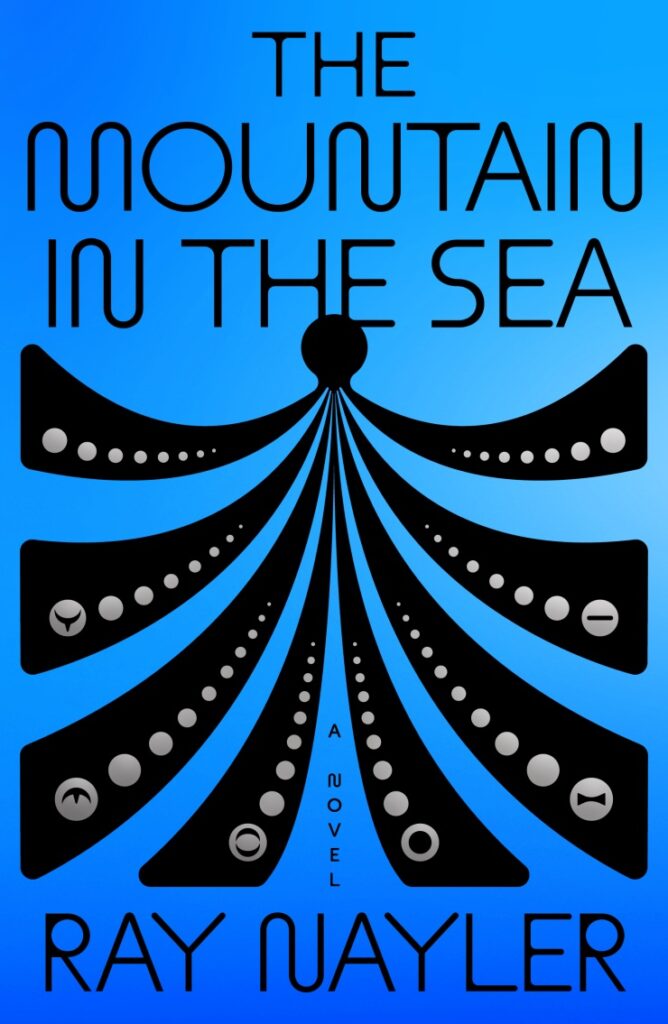Ray Naylor’s debut novel The Mountain in the Sea (2022) introduces the reader to a future where the climate has continued to erode, where major conflict between states have taken place, and where fishing vessels, controlled by artificial intelligences and operated by shanghaied and enslaved labour, scour the ocean floors for protein. It is a very dark future that clearly connects the ongoing socio-ecological crisis to overfishing driven by automated, predatory capitalism. It is also a story about the first contact with two new species. One is an android AI so advanced that it has become haunted by fundamental existential questions and anxieties. The other is an evolved breed of octopus that has developed not only language, but also writing, poetry, culture and religion. In effect, it is partly a story about how both machines and non-human animals have become something very akin to humans, which by necessity forces the question: what is a human? At the same time, it is a story about extinction. The android AI has been declared illegal by several governments. It/they will be terminated if it/they shows up in the wrong place. The new breed of octopi may also come to a quick and untimely end because of the predatory fishing vessels that circle the world’s oceans.
The scene thus set, the novel revolves around a scientist’s attempt to communicate with these two new life forms. Thus, the novel explores a long-standing topic in science fiction where humans have to figure out how to communicate with an advanced alien species. One of the most recent and critically acclaimed such investigations is Denis Villeneuve’s Arrival(2016). This is based on the short story “Story of Your Life” by Ted Chiang and the story sheds an interesting light not only upon The Mountain and the Sea, but on the very project that climate fiction is involved in. In Arrival, (spoilers to follow) a linguist is recruited by the US army to communicate with aliens who have suddenly arrived on a spaceship. As she deciphers their enormously complex form of communication – black circles drawn in a misty air – she discovers that it provides her with a certain understanding of the future. She also comprehends that the aliens know that some soldiers, frightened by their presence, will set off a bomb in the spaceship. The alien language she now speaks allows her to prevent this event from becoming a complete catastrophe, but she also learns that she will give birth to a daughter and that this daughter will fall seriously ill and die while still young. This, she can do nothing about.
Because it is climate fiction, The Mountain in the Sea is also an attempt to communicate the future – to speak back to a past that is the present, from a future that is still distant. This can be described as the central gambit of climate fiction from the Global North. It does so in the hope that readers will want to alter the historical trajectory that may produce the dark future it envisions. This is why many critics have described climate fiction as providing road maps to sustainable futures. There are certainly texts that attempt to provide such road maps, as Kim Stanley Robinson’s The Ministry for the Future (2020) exemplifies. However, it needs to be noted that many writers of climate fiction forget or ignore the fact that what is, in the Global North, mostly a future problem is, in parts of the Global South, already a lived reality. In addition to this, and as I have argued elsewhere, there is a great deal of climate fiction that elides the material reasons why there is a climate emergency, and for which the demise of capitalist modernity seems to be the actual emergency.
The Mountain in the Sea does not rehearse this trite story: it is climate fiction in the useful sense. It is set in Vietnam and it features a host of characters with long experience of the combined, uneven and unsustainable world-system that distributes food across the planet today. It also makes clear that the extractive and predatory food system is central to ongoing planetary-scale, socio-ecological breakdown. The image of an automated, AI-driven fishing vessel crewed by a new generation of slaves violently extracting “protein” from the seas is a striking image of the worst aspects of the existing world-food-system. This system is programmed according to a certain extractive logic. The ultimate purpose is not to provide food, but to enable the entities that have set it up to accumulate profit. The novel contributes to the conversation about food, the food-system and the future by making this clear. However, it also weighs in by giving a voice to species that have been reduced to a resource by the industrialised food economy. To be specific, it gives one particular type of sea creature – the octopus – a voice. And what the octopus says to the reader of The Mountain in the Seais literally this: leave us alone.

